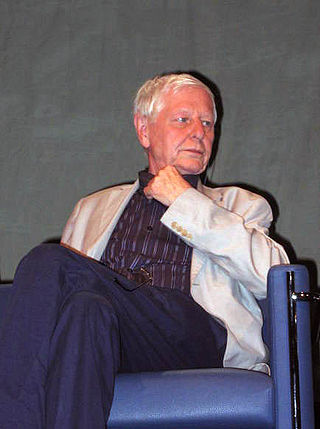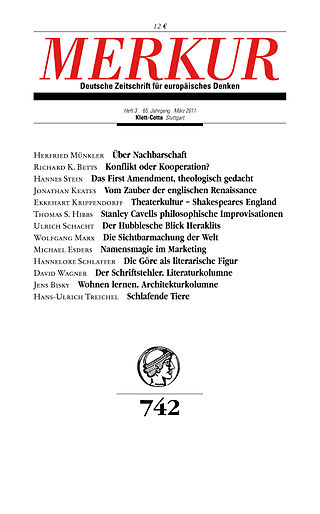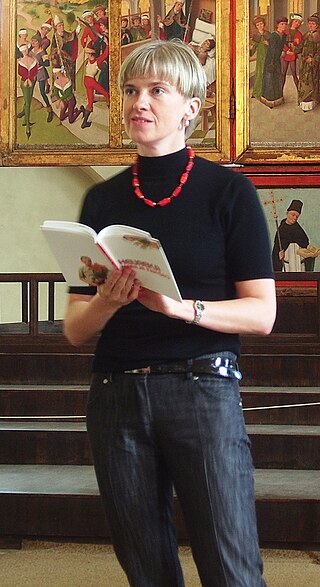Related Research Articles

Hans Magnus Enzensberger was a German author, poet, translator, and editor. He also wrote under the pseudonyms Andreas Thalmayr, Elisabeth Ambras, Linda Quilt and Giorgio Pellizzi. Enzensberger was regarded as one of the literary founding figures of the Federal Republic of Germany and wrote more than 70 books, with works translated into 40 languages. He was one of the leading authors in Group 47, and influenced the 1968 West German student movement. He was awarded the Georg Büchner Prize and the Pour le Mérite, among many others.
Michael Peter Leopold Hamburger was a noted German-British translator, poet, critic, memoirist and academic. He was known in particular for his translations of Friedrich Hölderlin, Paul Celan, Gottfried Benn and W. G. Sebald from German, and his work in literary criticism. The publisher Paul Hamlyn (1926–2001) was his younger brother.

The Deutsche Oper Berlin is a German opera company located in the Charlottenburg district of Berlin. The resident building is the country's second largest opera house and also home to the Berlin State Ballet.

MS Hans Hedtoft was a Danish cargo passenger liner that struck an iceberg and sank on 30 January 1959 on her maiden voyage off the coast of Western Greenland. The only piece of the wreckage ever found was a lifebelt.

Christian Enzensberger was a German Professor of English studies, author and a translator of English literature into German.

Kommune 1 or K1 was a politically motivated commune in Germany. It was created on 12 January 1967, in West Berlin and finally dissolved in November 1969. Kommune 1 developed from the extraparliamentary opposition of the German student movement of the 1960s. It was intended as a counter-model against the small middle-class family, as a reaction against a society that the commune thought was very conservative.

The Number Devil: A Mathematical Adventure is a book for children and young adults that explores mathematics. It was originally written in 1997 in German by Hans Magnus Enzensberger and illustrated by Rotraut Susanne Berner. The book follows a young boy named Robert, who is taught mathematics by a sly "number devil" called Teplotaxl over the course of twelve dreams.

Marta Hillers was a German journalist, and the author of the memoir Eine Frau in Berlin, published anonymously in 1959 and 2003 in German. It is the diary of a German woman from 20 April to 22 June 1945, during and after the Battle of Berlin. The book details the author's rape, in the context of mass rape by the occupying forces, and how she and many other German women chose to take a Soviet officer as a protector.

Merkur, subtitled Deutsche Zeitschrift für europäisches Denken, is Germany's leading intellectual review, published monthly in Stuttgart by Klett Cotta.

El Cimarrón is a scenic vocal composition by the German composer Hans Werner Henze, written when the composer lived in Cuba in 1969–1970. It is subtitled Biographie des geflohenen Sklaven Esteban Montejo, and the libretto by Hans Magnus Enzensberger is based on the oral autobiography related in 1963 to Miguel Barnet by Montejo, who was also a veteran of the Cuban War of Independence (1895–98).
Voices is a musical composition by the German composer Hans Werner Henze.

Loren Driscoll was an American tenor who had an active international career from the 1950s through the mid-1980s. Driscoll was particularly noted for his performances in contemporary operas and sang in many world premieres.

Maarja Kangro is an Estonian poet, short story writer, novelist, essayist, nonfiction writer and librettist.

Ventseslav Konstantinov was a Bulgarian writer, aphorist and translator of German and English literature.
The Frankfurter Anthologie is a collection of German poetry and accompanying commentaries, instituted by Marcel Reich-Ranicki in 1974 in the Frankfurter Allgemeine Zeitung, of which he was then literary editor, and overseen by him until his death in 2013.

Gaston Salvatore was a Chilean writer living in Germany and writing in the German language.
Martin Chalmers was a British translator, particularly of works in German. He was awarded the Schlegel-Tieck Prize by the Society of Authors. He was married to the German author Esther Kinsky.
William Seymour (Bill) Sewell was a New Zealand poet. He was a Burns Fellow at Otago University, Dunedin in 1981–82. He was a frequent reviewer of books, particularly for the periodical New Zealand Books, to which he was appointed co-editor in 1997. He was also a book editor. He died of cancer in Wellington.
pardon was a German satirical magazine, which appeared biweekly from 1962 to 1982. It was published to criticise the conservative situation of the Adenauer era.
The sinking of the Titanic was a maritime disaster in 1912.
References
- ↑ "Schriftsteller Hans Magnus Enzensberger gestorben". stern.de (in German). Retrieved 25 November 2022.
- ↑ "Der Untergang der Titanic Hans Magnus Enzensberger - Search". www.bing.com. Retrieved 25 November 2022.